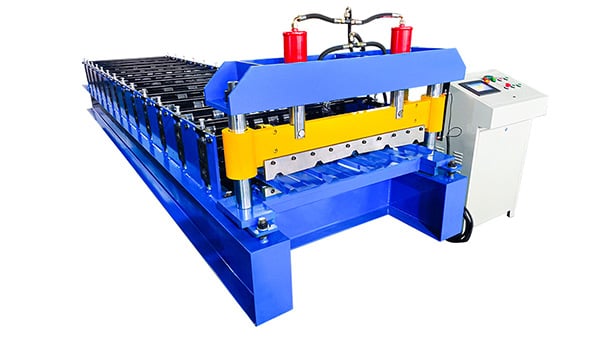The Evolution of roofing sheet roll forming machine
The roofing sheet roll forming machine has revolutionized the roofing industry by automating the production of roofing sheets. This machine, also known as a metal roof roll forming machine, has significantly increased the efficiency and accuracy of manufacturing roofing sheets. Let's delve into the various aspects of this remarkable machine.
Understanding the Working Principle
The roofing sheet roll forming machine is designed to transform flat metal coils into roofing sheets with specific profiles. It operates on a continuous process that involves feeding the metal coil into the machine, passing it through a series of rollers, and shaping it into the desired profile. The machine's precision and repeatability ensure consistent and high-quality roofing sheets.
The Advantages of Using a Roofing Sheet Roll Forming Machine
Investing in a roofing sheet roll forming machine offers numerous advantages for manufacturers. Firstly, it allows for faster production speeds, reducing manufacturing time and increasing productivity. Additionally, the machine ensures accurate dimensions and uniform profiles, leading to improved product quality. Moreover, the automation provided by the machine reduces labor costs and minimizes the risk of errors.
Types of Roofing Sheets Produced
The roofing sheet roll forming machine can produce a wide range of roofing sheets, catering to diverse customer requirements. Some common types include corrugated roofing sheets, standing seam roofing sheets, and trapezoidal roofing sheets. Each type has its unique characteristics and applications, making the machine adaptable to various roofing projects.
Material Compatibility
The roofing sheet roll forming machine is compatible with various materials, such as galvanized steel, aluminum, and stainless steel. This versatility allows manufacturers to cater to different customer preferences and market demands. The ability to work with different materials also opens up opportunities for producing customized roofing sheets.
Factors to Consider When Choosing a Roofing Sheet Roll Forming Machine
When selecting a roofing sheet roll forming machine, several factors should be taken into account. These include the desired sheet profile, material compatibility, production capacity, machine size, and ease of operation. It is essential to choose a machine that aligns with your specific manufacturing requirements to maximize efficiency and productivity.
Maintenance and Care
To ensure the longevity and optimal performance of a roofing sheet roll forming machine, regular maintenance and care are crucial. This includes routine inspections, lubrication of moving parts, and cleaning of the machine. It is also essential to follow the manufacturer's guidelines and schedule professional servicing when necessary.
The Future of Roofing Sheet Roll Forming Machines
The roofing sheet roll forming machine continues to evolve with advancements in technology. Newer models are equipped with advanced control systems, allowing for greater precision, flexibility, and efficiency. Additionally, the integration of artificial intelligence and machine learning capabilities is expected to further enhance the machine's performance and productivity.
Applications Beyond Roofing
While primarily used in the roofing industry, the roll forming machine has found applications beyond roofing. It is now utilized in various sectors, including the automotive industry, construction industry, and manufacturing of other metal profiles. The versatility of the machine makes it a valuable asset in different manufacturing processes.
In Conclusion
The roofing sheet roll forming machine has revolutionized the roofing industry, offering numerous benefits for manufacturers. Its ability to produce various types of roofing sheets, compatibility with different materials, and automation capabilities make it an indispensable tool in the manufacturing process. As technology continues to advance, we can expect further enhancements and applications for this remarkable machine.

